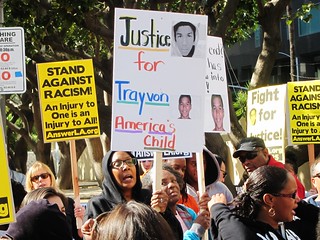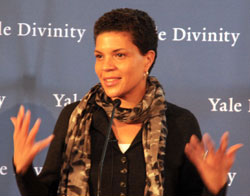“Even when I cry out, ‘Violence!’ I am not answered. I call aloud, but there is no justice.” (Job 19:7)
“A voice is heard in Ramah, lamentation and bitter weeping. Rachel is weeping for her children; she refuses to be comforted for her children, because they are no more.” (Jer 31:15)
“They have treated the wound of my people carelessly, saying, ‘Peace, peace,’ when there is no peace.” (Jer 8:11)
 Million Hoodies March in Los Angeles, 2012 (photo: CalvinFleming/Flickr/Creative Commons) |
These Scripture verses were among those streaming across my Facebook newsfeed on July 13, 2013 when George Zimmerman was acquitted in the February 2012 shooting death of Trayvon Martin. Ignoring a police dispatcher’s instructions to desist, Zimmerman had tracked Martin from his car, armed himself, and aggressively confronted the 17-year-old. The ensuing altercation left the unarmed teenager dead on the ground. Zimmerman would not be arrested until public outcry finally forced the hand of the Florida police. The acquittal of Zimmerman has galvanized renewed protests across the country. In an extraordinary unscheduled speech to the White House press corps on July 19, President Barack Obama responded by naming the racism that has deformed the daily lives of countless Black men, including himself. (See the Op-Ed piece on this by Charles M. Blow in the New York Times and the subsequent critique of President Obama offered by Cornel West on the Democracy Now! program.)
Activists among us are organizing rallies, signing petitions, hosting community conversations, and writing letters to federal and state officials. The Black Seminarians group at Yale Divinity School has issued a call to action, writing on July 23, “This case makes clear that racism and discrimination are systemic and institutional evils that are deeply embedded in the American social fabric. As a prophetic voice, we must speak to these and other injustices and call upon all people of faith to address these challenges with boldness, courage and honesty.” The NAACP and other justice organizations such as MoveOn, Color of Change, the Southern Poverty Law Center, and The Feminist Wire have been working on two fronts: to raise public awareness of the pervasiveness of racism in contemporary culture, and to persuade legislators to overturn “Stand Your Ground” laws in Florida and other states because of the racial bias transparently visible in the ways in which those laws have functioned in the U.S. judicial system. The “Stand Your Ground” law may not have been mustered officially for Zimmerman’s trial defense, but unmistakable indicators of racial profiling and prejudice have been widely seen as material to this case; further, legal experts and untrained observers alike have discerned points of contact with other cases where “Stand Your Ground” has been invoked explicitly.
Along with the political organizing that is so important at times like this, what can be done by those committed to theological education? I submit that it is vital for theological educators and pastors to commit to educational programs that build believers’ capacity for prophetic resistance to racism and White privilege.
 Michelle Alexander Speaking in Marquand Chapel (photo: Sarah Dunn/Yale Divinity School) |
In the parish, sermon discussions and book groups can provide rich opportunities for exploration of judicial issues related to race. A pastor could offer a sermon series on racial justice and the Gospel, following up with community workshops on privilege and bias. If done well, the kind of relationship-building invited through such work has the potential to transform a parish and its relationship with the local community. The coordinator of a spiritual formation program could gather a group to read Traci West’s Disruptive Christian Ethics: When Racism and Women’s Lives Matter (2006), James Logan’s Good Punishment? Christian Moral Practice and U.S. Imprisonment (2008), or Michelle Alexander’s The New Jim Crow: Mass Incarceration in an Era of Colorblindness (2012), which YDS read as a community a few months ago. Bible study leaders know that the Bible can be a powerful resource for deepening moral discernment and strengthening the prophetic voice of individuals and congregations. A leader could host a Bible study group to explore issues of accountability and grace, fostering dialogue between those who live in circumstances of privilege and those whose daily living continues to be fractured by racism in all of its forms, including economic violence.
At this dramatic moment in the history of race relations in the United States, we need the special charisms of progressive theological education at every level of our common life. (Yes, “progressive” education specifically: there is a huge difference between pedagogy that reinforces submission to authoritarian modes of knowing and pedagogy that opens learners’ imaginations to the importance of polyphony and faithful dissent.) Brave educators in parishes and classrooms may appreciate some suggestions to catalyze their own theological thinking. Here are three ideas.
- Encourage congregants and students to be courageous about naming the woundedness in their own lives and the systemic brokenness of our educational and political structures. Read Job, the psalms of lament, the Book of Lamentations. Honor the holiness of ancient witnesses who cry out against suffering and injustice. Don’t rush to “solve” the resulting discomfort. Build the capacity of those in your congregation or classroom to stay present to narratives of pain, inequity, deprivation, and violence.
- Invite congregants and students into lively theological debates of the past century. Bring key points from Karl Barth, Dietrich Bonhoeffer, James Cone, and Ada Maria Isasi-Díaz into conversation; then explore the implications of each position for real-life issues of justice. Engaging the polyphony of the Christian theological heritage can be transformative for believers navigating the complexities of faith and justice in today’s world.
- Promote multidimensional learning on issues of oppression: host a film series that invites viewers to grapple honestly with the realities of racism. Consider the 1994 film The Color of Fear by StirFry Productions, or the 1998 PBS documentary Africans in America, or one of the educational films by World Trust (“Social Impact through Film and Dialogue”), such as The Way Home: Women Talk about Race in America, Mirrors of Privilege: Making Whiteness Visible, or Cracking the Codes: The System of Racial Inequality. Film and video resources abound for this work.
Liberation theology teaches us that those who cherish Scripture must stand with the poor and the marginalized. Feminist theology lifts up as a sacred obligation the uncompromising resistance to violent power relations. Postcolonial biblical criticism is providing new tools to disrupt the pathological fantasies of imperialist cultural systems. Every sermon and Bible study session, every Church History syllabus and Ethics assignment, every blog post and pastoral workshop can make a difference in strengthening our communities’ moral and spiritual capacity for justice. For all who grieve the killing of Trayvon Martin and so many others, for all who oppose the racial bias that continues to mock justice in this country, progressive theological education has much to offer. Crucial work awaits us in the classroom, the parish, and the public square.